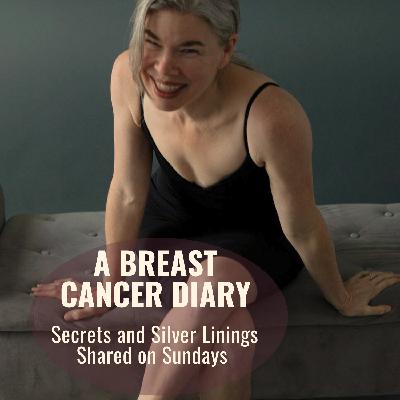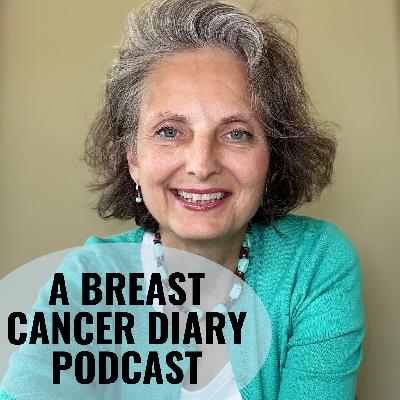Unexpected Outcomes and Showing our Scars
Description
This episode's guest is Christina Miner, host of Our Scars Speak Podcast. Today Christina shares about her experience with capsular contracture and her openness in sharing her scars publicly.
Don't forget to rate and review the show and if you want to enter for a prize for doing so, email a screenshot of your review to me at kathleenmoss@protonmail.com
Subscribe on: APPLE PODCASTS - SPOTIFY - AMAZON
Or watch on YouTube: https://youtu.be/agbu6QjDiXs
Support my work by making a donation here:
https://liberapay.com/abreastcancerdiary/
Join my Newsletter here:
https://abreastcancerdiary.substack.com
Resources from this Episode:
Christina's interview with Women's Health is here
Transcript:
Today's guest is Christina Miner from Our Scars Speak. Christina is a fellow flat advocate who's also in my Mastermind with my former guest, April Stears of Wildfire Magazine we're co advocates in the breast ca cancer space in many different areas, both podcasters, so we learn from each other sometimes on a monthly basis with April and some other breast cancer entrepreneurs in our mastermind. And I've been learning more about Christina, listening to her podcast, have so much in common with her, and I'm thrilled to have her today. Welcome Christina.
C:
Thank you for having me. I'm so excited. And it's so funny when you came to me and asked me, would I be a part of this? I was like, ABSOLUTELY! Cause unbeknownst to you. I had followed you and your story about DC is and things of that nature and how things that you found out and you didn't know. And I was like, wow, and it was just so powerful and enlightening to hear you share your story on. I think it was YouTube that I found you!
K:
Oh, really? I didn't know that.
C:
It's been a while ago, but I was like, oh, and I used to always think about you and just like, I hope she's okay.
K:
Aww. Thank you.
Yeah, when you share the raw stuff on YouTube, you kind of leave people hanging, and then YouTube doesn't show them the follow up video that says, I'm doing great. So it's kind of frustrating sometimes, but. Thank you for following me. I had no idea. So you live in Prince George, Virginia, on the other side of the country from me, and you are a counselor and working towards doing a master's in counseling and becoming a clinical therapist.
And up until now, you've been also, you've been doing life transition coaching with individuals as well. Is that mostly online?
C:
Mostly I do have some clients that have been around town that really have gone through, you know, like newly diagnosed with breast cancer. So yeah, or either they're starting a new business and mental health. So I do consultations and coaching and I call it transitional coaching because it's usually at a transition of life. And a lot of people are like, let's just get to the raw meat of what's happening. But I'm like, okay, we're going to get to that and we're going to do that. But how's it affecting all aspects of your life? Not just this one term, like how's it affecting going to potentially affect your health, your family, you know, your social life. So I try to make for sure their wellness is also encapsulated with just with the problem or the newness of a new venture that they're having. So, yes, I do transitional coaching and I do qualified mental health. I'm a qualified mental health professional, which is someone who goes in the home to do case management sometimes with various clients in Virginia.
Okay. So you work for the state right now. Or you did.
C:
Usually it's private organizations.
K:
Okay, cool. Okay. And what are you hoping to do once you have your master's? Are you going to branch into anything new?
C:
Yes. Well, not really new—I've done it before. It's just, I wasn't licensed at the time. Before breast cancer, I also was a partner in a mental health agency, a community based program. after breast cancer, I kind of, you know how it can be kind of stressful and you just like, you didn't, I didn't want to manage anyone.
I just wanted to relax for a little bit. So that's when I said, you know what, during this time, I'm just going to see which direction I want to go. And I was like, I talked to my partner and I was like, maybe I'll. Go ahead and just get a license in counseling and become a therapist. And so that's how I went in that direction, all for the hopes of one day having a wellness center where I want to be able to just like, not just therapy. Everybody doesn't want therapy all the time. So there's a lot of holistic things that people love to embrace when they're going through life period. Not just necessarily something that has happened to them, but. As you know, because I know you really, you know, you love various holistic things, yoga, you know, um, Pilates, uh, mindfulness meditation. So I want to have a wellness program, but I will probably just start out with the outpatient therapy, um, center first and then start incorporating all the other holistic aspects to it.
K:
Wow. I have had a similar dream, actually. When I first met my friend and mentor, Marlena Murphy, who passed this last year from stage four breast cancer. She was so inspiring to me because she worked in a place like that, like what you're describing, and I'd never heard of it before. It was a breast cancer patient-centric clinic that served folks not only in mental health, but also in massage therapy, physical therapy, nutrition, which is my thing. And I was like, Oh my gosh, that is such a great business model. So I'll have to talk to you more about that, that center that she worked in and it's in Georgia. So it's not super close to either one of us, but maybe we can meet there someday and do a little tour.
C:
Because honestly, when I was in one of my classes for career counseling, I came up with another idea to add to it. We had to think of this model of what, what would you do if you, you know, it had to be something different. So I'm not going to do a wellness center. Let me add something else. And something that stuck out to me and reminded me when you were speaking a lot of times when we are getting, you know, acclimated with life after or during our treatment or after our treatments. people change professions, and sometimes people want to change professions or go back to their profession and they just cannot their acclimation to society. Everything is just different because we've gone through this traumatic experience. And so I've seen where there's an absolute need to help people into what they want to do now, because now their perspective may have changed. You may want to do a whole different course far as career.
K:
Yeah. I relate to that. I can never go back to the me that I was before breast cancer as much as other people do and they have no problem doing that. I just can't somehow. So, well, let's talk a little bit about your experience, with your, your diagnosis and treatment. You had like me, your main diagnosis was DCIS, which is a pre cancer and the ductal areas is kind of what they're thinking. And, um, you had an expander placed because you had decided to get a double mastectomy and implants. Tell me the story of how that expander changed your life. What was that like?
C:
Wow! So with with the DCIS, you know, of course, I chose a double mastectomy and For various reasons. I just I was trying to avoid all Treatment for as radiation not to say that I never would do anything like that But it was just up for me and what I knew I was facing. I was trying to avoid all that meanwhile I was like well, I don't know, maybe I could get a little bit of my life back so maybe I'll do reconstruction.
Flat was given to me as an option. I must say by my doctor as one of the first options, she was like, you can go flat or you could, and then she started riddling off everything else. And I was like, okay. And I had







